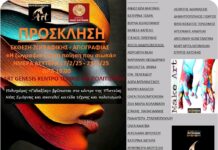Επιμέλεια: Εύα Πετροπούλου Λιανού
SHORT BIO: Taghrid Bou Merhi, a Lebanese multilingual poet, writer, journalist and translator living in Brasil. She has authored 21books, a translator of 24 books to date, a presenter of 25 books. Taghrid is a children’s story writer who also writes articles (56 articles), critical studies, and research. Her writings are part of several national and international magazines, newspapers, journals and anthologies( more than 60 Arabic books and more than 75 anthology internacional). Her poems have been translated into 47 languages, studied by literary critics, and featured on international radio stations.. She speaks six languages ( Arabic English Spanish Italian French And Portuguese ). She is an active member of various literary and creative platforms and editor of 10 Magazine Arabic. She is an advisory member among ten internacional poetry consultants chosen by Chinese media giant CCTV. She is advisor to the International Union of Arab Intellectuals, in the Media Authority for Translation Affairs and advisor to the countries Al-Sham literary platform for literary translation. Ambassador of the World Organization for Creativity for Peace in London. She has received numerous international awards, international Peace Medal Award, Peace Award, honorary certificate, creativity, ….

CRITICISM, THE CRITICAL PROCESS AND THE ROLE OF THE NEUTRAL CRITIC
Criticism is a talent given by God to whom He wills…
It is an intellectual domain strengthened by training and delving into linguistic science in all its forms and elevates through depth and contemplation in language, literature, and philosophy.
It’s like the talent of composing poetry or prose, it requires practice, refinement, and creativity…
The critic is an artist obliged to elevate the poet and poetry from a good stage to a better one, from a high rank to a higher one,
So criticism has no concern with base poetry or trivial prose; it has the role of guiding and awakening the literary caravan and is the doctor for the poetic and prosaic text, and for the poet and the prose writer.
Therefore, the critical process is a necessary aspect of literature
And not an addition or appendage, and the true critic is in a symbiotic relationship with the true creator because they complement each other.
What we find of decadence in criticism and literary art today
Is the result of the scarcity of the inspiring neutral critic as well as the scarcity of the true creator.
Poetry and prose have always been and still are a ladder of souls to souls, a spiritual ladder that flows through language and rhetoric, through the writer and the reader in the spaces of the written text, and in a state of spiritual and emotional harmony, thus man has needed from ancient times to literary arts and linguistic expression within clear rules
Distinguish between poetry and prose.
And the more sincere the linguistic ascent is in emotions and feelings, the more manifestations of the encounter between the writer and the reader, and the more exquisite the linguistic and rhetorical craftsmanship, the more the harmony and union between them increases.
The literary text moves historically and culturally among three people: the author, the reader, and the critic.
But there is a fundamental question that must be asked
Is every critic: a writer? A poet? A storyteller?
The natural answer: No
But the critic provides the literary experience with everything it needs to succeed, bear fruit, and transcend, and the critic understands and knows about poetry and storytelling many times more than the poet and the storyteller do. In fact, in ancient literary times, the critic was the one who awarded the title to the poet and arranged the ranks of the poets.
As for the era of literary decadence today, the inspiring critic has no significance or value, and he is detested by every writer.
Then we come to the second and most important question:
Should every author of poetry or prose be a critic?
The natural answer: Every author should be a critic, but according to the quality of their writings..

It is obvious that the craftsman should know the principles, ethics, virtues, and secrets of the craft, and learn how to start and progress in learning it, then learn the secrets of his craft to create and excel in it.. Likewise, if the poet or storyteller cannot criticize his writings and uncover their weaknesses and highlight their strengths, no matter how hard he tries, what he writes will be fragile because ignorance does not align with creativity, meaning ignorance of the principles of writing, language art, and composition, not ignorance in the sense opposed to study in universities and schools. If we delve into this foundation, we will find one of the main reasons for the decadence of literary text today.
Constructive and Purposeful Criticism:
Constructive literary criticism has always been and still is like the good tree, its roots are stable, and its branches in the sky bring nothing but abundant goodness.
Constructive criticism has a wonderful ability to transform things and channel them by turning them from clear negativity to clear positivity. The intelligent critic is the one who possesses the tools of criticism and can crystallize and purify the negative background into a cognitive system while considering all the necessities of harmonizing between theory and reality, and the serious, purposeful application to reveal the beauty in the criticized text.
In this context, criticism can be summoned as a desirable discourse, and a theoretical framework suitable for dealing with various issues methodically and cognitively through the basic tasks of criticism with the aim of clarification, communication, refuting doubts and fallacies. Criticism is a rhetorical turning point with its own conceptual state to transition things from a state of stagnation to a state of alertness, grasping them by their essence and thus elevating them from where they are to a new state of refinement and development, aiming to transform them from a state of despair to a state filled with well-being and transcending towards realms of contribution. The critic can demonstrate his effectiveness and presence through his actions linked to events and can change vague concepts drawn from the contents of his long experience in research and follow-up within purposeful standards. He is always the link and channel of communication between the writer and the recipient.
The critic invokes the application of his critical work on the concept of developing things within the context of an integrated cognitive system and subjecting his work to a triad of theory, namely (vision, intellect, and wisdom), so that this triad forms an ideal reference leading to success and excellence. Focusing on clear, explicit, and purposeful critical aspect and celebrating it by the concerned authority places him on the horizon of transitioning from passive action associated with weak dimensions to serious work linked to a diligent revival, ultimately leading to the hidden outcome of construction, development, and progress. It is always what we aim for in an esteemed Arabic literary discourse that deserves its rightful place among comparative literatures.
©® TAGHRID BOU MERHI – LEBANON – BRAZIL






























